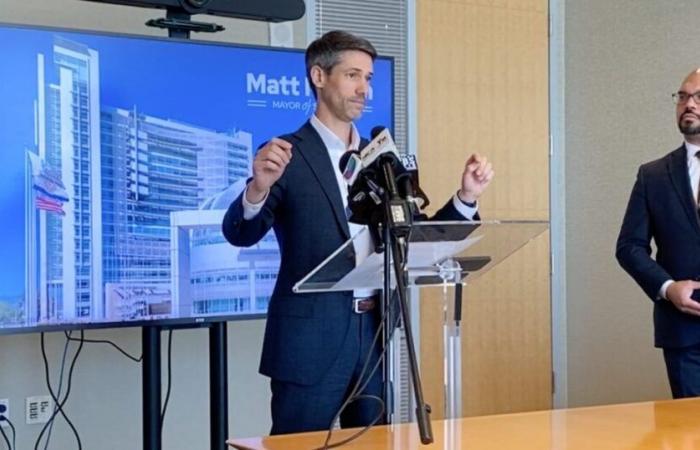More details are emerging about the plan of the mayor of San José, Matt Mahan, to arrest or hospitalize homeless people for rejecting refuge offers, and the city could create a police unit to do so.
Mahan presented more details about his “responsibility to house the initiative was presented on Thursday, including the expansion of municipal homeless persons assistance initiatives and the establishment of a new police unit for its application. According to the proposed policy, the homeless people who reject accommodation three times in a period of 18 months will be cited and arrested for search.
Mahan said that arrests would be considered non -violent minor crimes and hopes to collaborate with Santa Clara County to lead people cited under this policy directly to a rehabilitation center, without the approval of a judge or jail. A collaboration with the county on this proposal has not yet been completed, and the county officials are … disagree with Mahan’s plan.
“The goal has always been to give people the help they need,” said Mahan. “We are making a historical investment so that people can return to their homes and access services. If they refuse us repeatedly, we are gladly transfer them to the Mission Street recovery center to receive the help they need.”
The city plans to add 1,400 beds in shelters during the next year. Several housing sites are expected to be operational this year, including minicasas in Cerecia Avenue, Vía del Oro and an extension Ferrari street. The safe sleep site near Watson Park will also open soon. There are approximately 6,340 homeless people in San José. As of 2023, with approximately 5,550 being without refuge.
Mahan said that the city plans to create a unit of “quality of life in the neighborhood” in the San José Police Department to take care of the application of the law. The unit, composed of a sergeant and six officers, would focus on the great camps of homeless people and “areas without return.” He said that there is no specific trigger about when the police unit could be called, since those officers will patrol and enforce other municipal codes, such as damage to the property or interception of the city’s lights.
He clarified that they can only measure people’s refusal depending on the availability of beds in shelters.
The housing director, Erik Soliván, said that the city’s community extension teams will continue to be the main point of contact so that homeless people connect with services. Another aspect of the proposal is to expand the city’s community extension team to save money and allow the city to collect more precise data, Mahan explained. The city launched a team of 10 people. Internal extension equipment earlier this year.
“We want to have a file of each person who is abroad,” said Mahan. “Our scope will be smarter, more connected, more based on data and, frankly, more useful in general.”
While Mahan and other municipal officials promote the plan as a compassionate strategy to get people out of the street, homeless residents and their defenders have raised multiple concerns and accuse the mayor of criminalizing the situation. Mahan said that these types of arrests are rarely charged, and that a case manager of a rehabilitation center could help eliminate arrests from people’s criminal record.
The costs of the proposal are not clear, but Mahan said that more information will be discussed at the Budget Hearing on Monday.
Homeless people have reported more aggression and harassment of order forces since Mahan presented their proposal in March. This year, the city began to broadcast temporary prohibitions of recreational vehicles and accelerated scanning camps of homeless people, who move people throughout the city.
Poncho Guevara, Executive Director of the Community Service of the Sacred Heart, said that the city must focus on reducing the cost of living and preventing the lack of housing, instead of criminalizing it. Members of the non -profit organization plan to protest against Mahan’s policy on Monday, before the Budget Hearing.
“The city should resume the task of really investing in affordable permanent housing and prevention,” Guevara told San José Spotlight. “That’s where we will see real progress, not to blame homeless people for their situation and demand access to shelters or resources that they literally do not exist.”
History updated on May 8 at 4:14 pm original story published on May 8 at 1:45 pm
Contact B. Sakura Cannestra in [email protected] or @SakuCannestra in x






